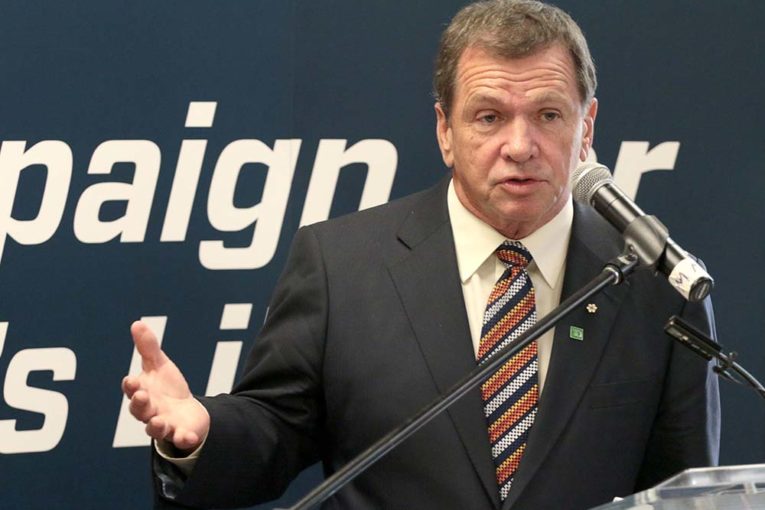
The B.C. government talks a lot these days about the possibility of a catastrophic oil spill tied to pipeline expansion.
The very idea evokes emotion on both sides of the Rocky Mountain divide.
Fear is a great motivator.
So is patriotism.
Frank McKenna, Canada’s former ambassador to the United States, wants to bring another card to the pipeline debating table: the country’s economic self-interest.
“As a Canadian, I feel passionate about this,” McKenna, who also served as premier of New Brunswick for a decade, said in an interview.
“This dissipation of resources, this waste of a great national resource — and this vaporization of so much Canadian wealth — is offensive to me.”
Such forceful talk isn’t a surprise.
Last week, McKenna joined Premier Rachel Notley’s new task force to find ways to improve market access for Alberta’s oil and gas.
It’s also coming up with options to respond to British Columbia’s proposed regulations that would limit bitumen shipments moving through that province.
If successful, B.C.’s measures would delay and possibly derail the Trans Mountain pipeline expansion that Alberta is heavily promoting.
McKenna presents the economic case for the $7.4-billion development, which will triple the capacity of the existing Trans Mountain line that moves oil from the Edmonton area to Burnaby.
He said it makes no sense for Canada to continue to sell its oil at huge discounts to U.S. and world prices because it lacks the ability to get new energy infrastructure built.
McKenna, who now serves as deputy chairman of the TD Bank, said work done by the financial institution indicates the price differential has cost Canada about $117 billion in the past seven years.
“That is a colossal amount of money for Canadians to lose, simply because they don’t have access to competitive markets,” he said.
“That’s money coming right out of Canadians’ pockets.”
The discount he refers to is the differential between benchmark U.S. prices and Western Canadian Select heavy crude. The gap expanded to almost US$40 a barrel back in December 2013 but shrank to $11 last fall.
With oilsands production continuing to grow and pipelines constrained in recent weeks, the discount sat at $28.15 a barrel on Friday.
McKenna isn’t the only one making the economic argument.
On Thursday, Cenovus Energy CEO Alex Pourbaix told the Canadian Press that if the differential narrowed by US$10 a barrel, Alberta would see another $50 million a day pumped into the economy.
Instead, the price gap amounts to a “transfer of wealth from Alberta and Canada to U.S. refiners and U.S. consumers,” he said.
In other words, we’re chumps to leave money on the table while others are benefiting.
McKenna, it should be noted, is on the board of directors of oilsands giant Canadian Natural Resources Ltd., but the former ambassador said that’s not why he’s on the premier’s new panel.
He supported the now-defunct Energy East pipeline proposal that would have shipped Western Canadian crude all the way to the Atlantic coast.
Now, he vigorously backs Trans Mountain, which is expected to open up new export opportunities into Asia for Alberta crude.
Most Canadians don’t know that this country sends 99 per cent of our oil and natural gas exports to one customer: the United States.
McKenna hopes to change that by speaking out.
“At a time when Canadians are somewhat hostile towards Trump, I don’t know why they’re happy in subsidizing (the president) and the United States of America to the tune as much as $30 billion a year,” said McKenna.
“It makes no sense for us to have a single buyer.”
Opponents of Trans Mountain discount the economic rationale, saying the risks are too high. The government of B.C. Premier John Horgan says it’s concerned about the environmental and economic consequences of a potential spill.
“We are putting in place a consultation … so that the public has an understanding of the potential impact of a catastrophic spill within British Columbia,” Horgan told reporters this month.
Yet, these issues were studied by the National Energy Board and the project was later approved by the federal cabinet.
Notley calls the B.C. government’s actions unconstitutional. Prime Minister Justin Trudeau said this week Horgan is threatening to scuttle the national climate change plan he crafted with the provinces.
McKenna agrees, saying a “very implicit part of the deal” was Alberta would agree to cap greenhouse gas emissions from the oilsands and put in place a carbon tax.
In return, “it was implicit in that (agreement) there be pipeline access so that Alberta could extract the maximum economic rent from its resource, having limited its ability to grow that resource,” he added.
“If you have Alberta carbon policy falling apart, I think it would really undermine the national carbon strategy.”
He’s right. It’s tough to imagine the plan holding together if the country’s largest energy producer and emitter isn’t playing ball.
As for the politics at play today, McKenna said it’s pretty clear what’s happening in B.C.
Small groups with loud megaphones have more control of the agenda than large numbers of citizens who are less motivated to speak out, he said.
“When I was premier of New Brunswick, we supported a refinery built right in the city of Saint John, with some of the largest tankers coming in almost daily. We’ve never had a catastrophic spill and we were pleased to do that,” McKenna said.
“There are sometimes when you have to think about what is in the best interests of the country.”
It’s a powerful argument.
But is economic self-interest and patriotism strong enough to trump fear and loathing in a Canadian pipeline fight?
The answer to that question will play out soon enough.
Chris Varcoe is a Calgary Herald columnist.
You can read more of the news on source
